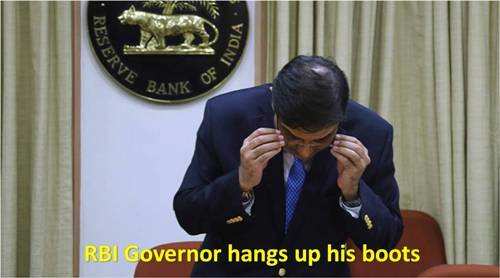Chaos in Regulatory and Democratic Institutions of India as ruling party enters last phase
Urjit Patels resignation reeks of dictatorship taking the toll on democracy...read on

Democracy and regulatory bodies in India have literally been kept at gun point over the last 4 and a half years. Under the guise of ruling with an iron hand, dictatorship and fascism have taken precedence…apparent, as Urjit Patel, RBI Governor, hangs up his boots.
Supreme Court chaos, CBI in fighting and chaos due to interference by the government, resignation of the RBI Chief Raghuraman Rajan due to “personal reasons” (read: interference by political incumbents and those in power at the centre) and now, what looks like the last straw, resignation for “personal reasons” by Urjit Patel, the Governor of the Reserve Bank of India, who had come in place of Raghuraman Rajan, after his resignation in 2016.
Raghuraman Rajan, has rightly said that the resignation of the Governor is indeed a reason for immense worry for India. The tweets from the leaders of the ruling party hailing Urjit Patels class and commitment and “we will miss him” reeks of hypocrisy. When regulation and polity are stinking of dictatorship and fascism.
Various points of arguments between the government and Reserve Bank of India including that of autonomy of the institution have apparently resulted in the resignation of the Governor. Resigning from a post of immense responsibility takes a toll on the psych of the incumbent, provided he has strong values and integrity. Resigning is equivalent to hanging up the boots in military parlance. However, the pressure on a person of integrity performing under constitution and regulatory guidelines must have been so immense, such as to cause him to let go of his position of responsibility as well as authority, just 9 months before he was due to retire. This sort of pressure comes from either within the institution, or from a parallel ruling pillar. The reasons here, seem to be latter rather than former.
What were the points of contention:
1. Interest Rates: RBI refused to reduce the interest rates 2. PNB Scandal: RBI was questioned on the regulatory and control mechanisms over the PNB Scandal 3. Nachiket Mor: Nachiket Mor was removed from the RBI board was cut short by the government in October 2018. He had objected to higher dividends. 4. NBFCs: RBI was reluctant to allow leverage to NBFCs 5. NPA Classification: NPA reclassification by the RBI was found to be too rigid by government.
The issues ignited in the regulatory, democratic and legislative institutions in India over the last few years, apparently speak of an attack on legislative and regulatory by the executive and also on the secular and democratic fabric of the country.
Image Credit: PRASHANT NADKAR
To join us on Facebook Click Here and Subscribe to UdaipurTimes Broadcast channels on GoogleNews | Telegram | Signal


